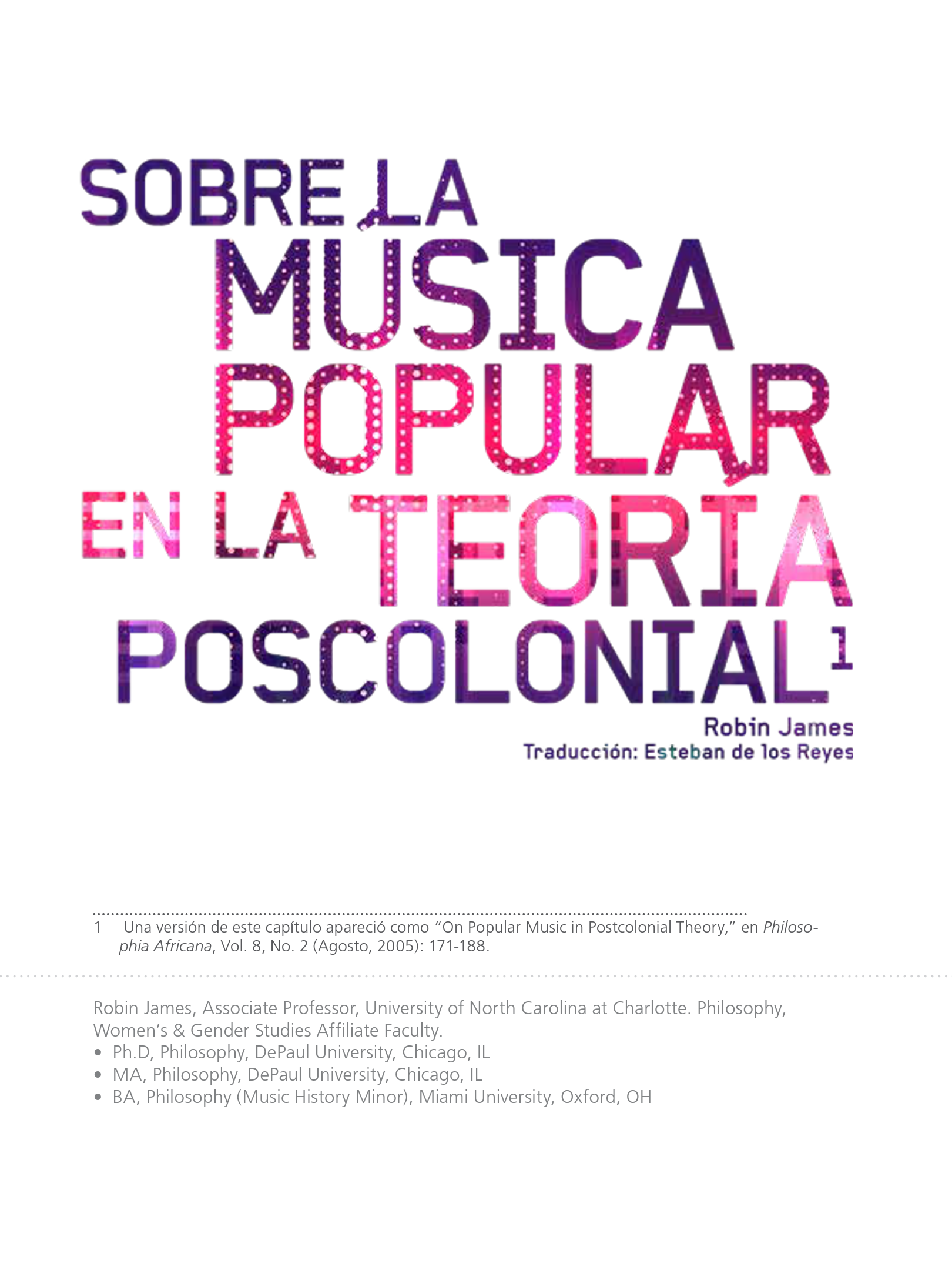On Popular Music in Postcolonial Theory

Published 2018-12-21
Keywords
- Popular music,
- race,
- gender,
- postcolonial theory,
- coincidence
How to Cite
Copyright (c) 2018 Robin James

This work is licensed under a Creative Commons Attribution-NonCommercial 4.0 International License.
Abstract
This essay argues that while most scholars in this area treat music as an example of race, racial embodiment, and racial politics, this "example" model inaccurately treats each area (race, music, and sometimes gender) as a distinct discourse. If what is at stake in defining what constitutes music and what constitutes race is fundamentally the same issue "” the determination of the relationship between raced, colonized, or resonating bodies and the social forces which operate in, through, and on these bodies"” then the relationship between raced and resonating bodies is not so much exemplary or representative as it is what I call "coincident." While Angela Davis"™ Blues Legacies and Black Feminism (1998) explicitly examines the coincidence of gender, race, and class as it is "expressed" in the music of Ma Rainey, Bessie Smith, and Billie Holiday, it also implicitly begins to draw out the coincidence of gender, race, and class with the discourses and practices which came to constitute "the blues." Thus, I turn to this text as an instance of how the "example" model is transformed into a coincidental or conjectural model of the relationships among race, class, gender, and music. I have adopted the term "coincidence" to describe the relationships among race, gender, and music because it is a more accurate metaphor than the widely used and critiqued language of intersectionality.
Downloads
References
- Attali, J. (1987). Noise: The Political Economy of Music. Trans. Brian Massumi. Minneapolis: University of Minnesota Press.
- Butler, J. (1990). Gender Trouble. Nueva York: Routledge.
- Crenshaw, K. W. (1995). "Mapping the Margins: Intersectionality, Identity Politics, and Violence Against Women of Color". En Crenshaw, K., Gotanda, N., Thomas, K., y Pellar, G. (eds.). Critical Race Theory, pp. 357-83. Nueva York:The New Press.
- Davis, A. Y. (1998). Blues Legacies and Black Feminism. Nueva York: Vintage Books.
- Epstein, P. (1986). "Pattern Structure and Process in Steve Reich"™s "˜Piano Phase"™". The Musical Quarterly 7 (4), 494-502.
- Eshun, K. (1998). More Brilliant than the Sun: Adventures in Sonic Fiction. Londres: Quartet Books.
- Fox, A. (2004). "White Trash Alchemies of the Abject Sublime: Country as "˜Bad"™ Music". En Washbourne, C. y Derno, M. (eds.). Bad Music: The Music We Love to Hate, pp. 36-91. Nueva York: Routledge.
- Gilroy, P. (1996). The Black Atlantic: Modernity and Double Consciousness. Cambridge, Mass.: Harvard University Press.
- Hall, S. (1996). "What is this "˜black"™ in black popular culture?". En Morley, D. y Chen, K-H. (eds.). Stuart Hall: Critical Dialogues in Cultural Studies, pp. 468-78. Londres: Routledge.
- Hames-García, M. (2000). ""˜Who Are Our Own People?"™: Challenges for a Theory of Social Identity". En Moya, P., y
- Hames-García, M. (eds.). Reclaiming Identity: Realist Theory and the Predicament of Postmodernism, pp. 102-132. Berkeley: University of California Press.
- Hight, C. (2003). "Stereo Types: The Operation of Sound in the Production of Racial Identity". Leonardo 36 (1), 13-17.
- James, R. (2005). "On Popular Music in Postcolonial Theory." Philosophia Africana 8 (2), 171-88.
- McClary, S. (2000). Conventional Wisdom: The Content of Musical Form. Berkeley: University of California Press.
- Narayan, U. (2000). "Essence of Culture and a Sense of History: A Feminist Critique of Cultural Essentialism." En Narayan, U. y Harding, S. (ed.). Decente- ring the Center: Philosophy for a Multicultural, Postcolonial, and Feminist World, pp. 80-100. Bloomington: Indiana University Press.
- Nicholson, L. (1998). "Interpreting "˜Gender."™". En Zack, N., Shrage, L., y Sartwell, C. (eds.). Race, Class, Gender, and Sexuality: The Big Questions, pp.187-211. Malden, MA: Blackwell Publishers.
- Oakes, J. L. (2004). "Pop Music, Racial Imagination, and the Sounds of Cheese: Notes on the Loser"™s Lounge". En Washbourne, C. y Derno, M. (eds.). Bad Music: The Music We Love to Hate. Nueva York: Routledge.
- Reich, S. (2004). "Music as a Gradual Process". En Cox, C., y Warner, D. Audio Culture: Readings in Modern Music, pp. 304-6. Nueva York: Continuum.
- Rose, T. (1994). Black Noise: Rap music and black culture in contemporary America. Middletown, Conn.: Weslyan University Press.
- Schwartz, K. R. (1981). "Steve Reich: Music as a Gradual Process pt. 1". Perspectives of New Music 19 (1â„2), 373-392.
